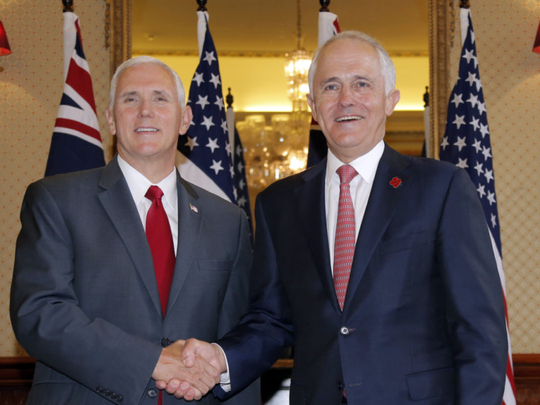
Australia is punching well above its weight militarily in the fight against Daesh (the self-proclaimed Islamic State of Iraq and the Levant), but I hope there could be more to come from the Commonwealth’s other considerable skills.
It is not just Daesh but also the Syrian regime that is hell bent on continuing the war in Syria. With the United Kingdom in the inertia of yet another election, Australia could use its very considerable political and diplomatic muscle to help move the United Nations to a realistic solution to the six-year Syrian conflict.
Brexit is thankfully bringing the United Kingdom and Australia closer together again, and it is clear from United States Vice-President Mike Pence’s visit to Australia last week what a key ally Australia is to Washington. I may be looking through rose-coloured spectacles, but having spent a year with the Australian Army in Melbourne, and Sydney being my favourite place in the world, I am very keen to try and cajole the Australian government to use its very considerable influence — which sometimes I think Australian people don’t fully appreciate — to realise a better future for Syria.
For example, the Australian government could usefully throw its weight behind the Geneva process, which aims to deliver a political and diplomatic solution to the Syrian crisis. If the international community can build on the fledgling ceasefire, create safe zones for aid delivery and reconstruction, policed by UN peacekeepers, there is just a chance that the Geneva process could deliver a lasting peace in Syria in the next 18 months.
A report released four weeks ago by the international charity, Save the Children, said Syrian youngsters are showing signs of “toxic stress” that can lead to life-long health problems, struggles with addiction and mental disorders lasting into adulthood. My charity, the Union of Medical Care and Relief Organisations (UOSSM), says 75 per cent of children between the ages of eight and 13 have PTSD [post traumatic stress disorder] and 50 per cent are incontinent. The use of child soldiers is on the rise in Syria, according to Unicef. At least 851 children were recruited by armed factions last year — more than twice compared to the year before.
Aid is unable to reach the vast majority of rebel areas because of Daesh and the risk of air attack from the Syrian regime. This can only change with UN support to enable aid delivery and reconstruction. The humanitarian safe zone concept recognises that rehoming more than five million displaced refugees is not a long-term option for Syria — if nothing is done to reverse the outflow from Syria, this could grow by another seven million.
Safe zones could also be the catalyst to reconstruct this flattened and devastated land and get meaningful amounts of aid in quickly. The humanitarian safe zone concept recognises that the vast majority of Syrians want to remain in Syria or return to Syria if it is free of the tyranny and the terror of Daesh. US President Donald Trump appears now to support safe zones for Syria and Australian support would add much weight to this proposal.
A safe zone pilot scheme in north-west Syria could be seen as a bridgehead for Syrians to re-occupy their country as a viable alternative to a life in Europe. If successful, the concept can be replicated in the south on the Jordanian border and beyond. At the same time, the global fight against Daesh can begin in earnest in Syria with US, Australia, UK, Turkey, Russia and all allies working together, with the safe zone expanded into areas as they become liberated from Daesh.
In practical terms, Australia could use its considerable influence at the UN and among the ABCA (Australia, Britain, Canada and America) Alliance and lead the way in the development of safe zones. This would require UN military and humanitarian experts on the ground in order that food, water and electricity could flow in from the many NGOs situated just over the border in Turkey.
The UK charity, Syria Relief, runs some of the very few functioning schools. Yet, a generation of children are completely missing their education and this must be reversed. UOSSM runs a number of hospitals and clinics in the area and is preparing to up this effort if the safe zone materialises. Our main hospital at Bab Al Hawa, just over the Turkish border near Ryhanli, has treated many of the most challenging cases from East Aleppo and the Idlib chemical attack, but is short of some critical medicines and equipment.
Security on the ground must be policed by UN peacekeepers. UK foreign secretary Boris Johnson has already said that UK troops might be available. Australia could also offer troops as peacekeepers, as they are among the best in the business. They could enable aid delivery across this area and reconstruction, which will create positive conditions to allow the Geneva process to develop.
Nobody is under any illusion of the challenges ahead for the ceasefire, safe zones and the Geneva process in Syria. It will require Turkish, Russian, Iranian, US, Australian, UK and UN support and agreement. Significant resources are required for success, but the eventual cost will be less than housing five to 12 million displaced Syrians.
But most importantly, leadership is required, and with the super powers at loggerheads, I genuinely believe that key global influencers, with Australia to the fore, must lean into this challenge for the good of all and give positive impetus to the Geneva process.
— Guardian News & Media Ltd
Hamish de Bretton-Gordon Order of the British Empire, is a director of Doctors Under Fire and an adviser to UOSSM.










